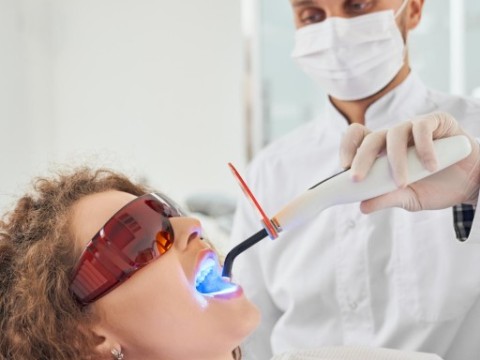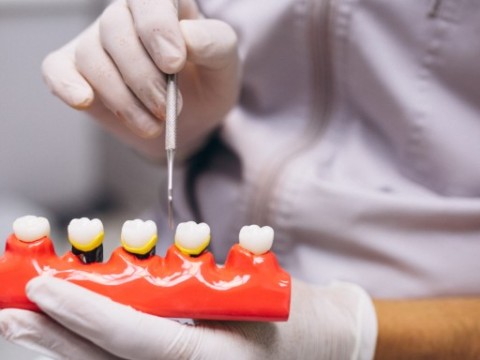Quote of Laradent Premium Clinic
Laradent Premium Clinic: Dental scaling
Scaling of teeth, popularly known as dental cleaning, is a major essential dental practice that plays a major role in oral health. When plaque on the teeth hardens over time, it becomes tartar or dental calculus. Further, if this formation is not treated, it may lead to serious disorders like gum diseases, cavities, and other dental problems. Regular scaling of teeth is very necessary not only for aesthetic purposes but also to avoid potential health complications.
What is Teeth Scaling?
Scaling of the teeth is a dental procedure intended to remove plaque and tartar from the surfaces of the teeth and below the gums. It is generally performed by a dental hygienist or dentist with specific instruments and tools. Scaling mainly deals with preventing gum diseases and maintaining proper oral hygiene.
Scaling Process
The process for scaling generally includes the following:
Assessment: The dentist or hygienist will look into your mouth for any areas that have a heavy buildup of tartar, simply for an assessment of general dental health.
Scaling: The professional does this with the help of a handheld instrument or by using an ultrasonic device to carefully remove plaque and tartar from the teeth.
Polishing: After scaling, teeth are polished to remove minor stains and roughened surface caused by scaling.
Fluoride Treatment: Depending on the situation, a fluoride treatment may be applied to strengthen the enamel.
It might take up to 30 minutes or an hour, depending on the magnitude of the deposit and the number of teeth that need to be treated.
Whom to Recommend Scaling of Teeth to?
Scaling of teeth is recommended for all people, but some groups are going to benefit more significantly from this, such as:
People with Gum Disease: People who have early stages of gum disease, such as redness, swelling, and bleeding gums, should under scaling.
Heavy Tartar Formation: People who have poor oral hygiene habits that lead to heavy plaque and tartar formation.
Smokers: Plaque formation is increased in teeth due to smoking; hence, smokers need scaling more often.
Scaling might be necessary, as diagnosed during regular dental check-ups.
Frequency of Scaling of Teeth
Frequency Teeth scaling is done depending on individual oral health needs. It is generally recommended for the teeth to be cleaned at least twice a year. More frequent visits, however, may be required if one has some specific dental problems. Your dentist will give personal recommendations concerning your dental status.
Benefits of Teeth Scaling
Teeth scaling comes with a number of advantages:
Preventing Gingivitis: It prevents gingivitis and further serious gum diseases by regular scaling.
Fresh Breath: The removal of tartar and plaque reduces bad breath usually brought about by bacteria in the mouth.
Healthier Teeth: The scaling process may prevent the development of cavities and generally help improve the health of the teeth.
More Attractive: A thorough cleaning of the teeth leaves them whiter and smoother.
All these contribute to a general improvement in health and well-being
Possible Risks and Side Effects
Though the process of teeth scaling is safe in most conditions, yet these are a few minor changes that are often noticed:
Sensitivity: Just after the treatment, teeth are sensitive.
Gum Discomfort: Sometimes patients may feel a little discomfort or bleeding from the gums, especially when they already have some form of gum disease.
These effects are temporary and can be curbed with good care.
Aftercare Tips
Following the scaling of teeth, for the maintenance of oral health, here are a few aftercare tips to be followed:
Avoid Hard Foods: Crunchy or hard foods may also cause irritation to your gums; hence, such food should be avoided for the first 24 hours.
Good Oral Hygiene: Brushing and flossing regularly help you to keep healthy teeth and gums.
Water Intake: Keeping your mouth moist is effective in washing away all additional food particles and bacteria in your mouth
Follow Up Appointments: Many follow-up appointments are advised which one must attend to keep tab on their dental health
Conclusion
It is important that teeth scaling should be done in order to avoid serious dental problems. By understanding what a scaling procedure actually is, the benefits accrued from it, and post-scaling care, informed decisions concerning oral hygiene may be made. If you haven't had your teeth scaled in a while, you might want to make an appointment with your dentist. A healthy smile indeed is a beautiful thing, but more than that, it speaks to health and wellness. Take that first step today towards a brighter and healthy smile!
- All on 4 Implant
- All on 6 Implant
- Amalgam Fillings
- Bone Graft
- Composit Filling
- Dental Cleaning
- Dental Crowns
- Dental Filler
- Dental Implant
- Dental Veneers
- Endodontics
- General Dentistry
- Gingivectomy
- Gum Disease Treatment
- Gum Lift
- Hollywood Smile
- Orthodontics
- Periodontics
- Restorative Dentistry
- Root Canal
- Health Insurance
-
Accommodation
- Online Healthy Life Assistant 9/5
- Post - Experience Follow Up 6 Month
-
Extra Privileges
- Transfer

- Health Insurance
-
Accommodation
- Online Healthy Life Assistant 24/7
- Post - Experience Follow Up 1 Year
- Pre-Treatment Doctor Consultation
-
Extra Privileges
- Transfer

 Private
Private
- Health Insurance
- Healthy Life Butler
- Post - Experience Follow Up 2 Year
- World-Famous Doctor Consultation
-
Extra Privileges
* Price varies depending on extra and upgrade selections.
Tooth stone cleaning, also known as dental calculus removal or scaling, is a dental procedure aimed at removing hardened deposits of bacterial plaque (calculus or tartar) from the teeth. These deposits can accumulate over time and contribute to various dental issues.
Tooth stone cleaning is typically performed by a dental professional using specialized tools such as scalers and ultrasonic devices. These tools help break down and remove the hardened calculus from the tooth surfaces.
The procedure is generally not painful, but some individuals may experience mild discomfort. Local anesthesia can be used if needed.
The frequency of tooth stone cleaning depends on an individual's oral health. It is often recommended once or twice a year during routine dental check-ups.
Tooth stone cleaning offers several benefits, including prevention of gum diseases, improvement of oral hygiene, reduction of bad breath, and overall maintenance of dental health.
Yes, tooth stone cleaning is generally safe during pregnancy. However, it's advisable to inform your dentist about your pregnancy for proper care.
The duration of the appointment can vary but usually takes around 30 minutes to an hour, depending on the extent of calculus buildup.
Regular and thorough oral hygiene practices, including brushing, flossing, and routine dental check-ups, can help prevent tooth stone formation. A well-balanced diet and avoiding tobacco products also contribute to oral health.




